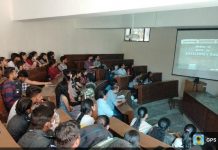New Delhi, December 11: The Rajya Sabha passed the Citizenship Amendment Bill on Wednesday, choosing not to send the contentious Bill to a select panel for review.
The House voted for the motion 125-105. The Shiv Sena, a former ally of the Bharatiya Janata Party, walked out before the vote.
Home Minister Amit Shah tried to fend off criticism over his government’s controversial Citizenship Amendment Bill in Rajya Sabha in his reply to the House, as protests against Bill escalated in the Northeast.
Shah, who faced Rajya Sabha on Wednesday hours before the Bill is put to vote in the House, once again repeated the justification he made for the Bill in Lok Sabha—that it was the country’s partition in 1947 that made the proposed amendment necessary.
The proposed amendment controversially grants citizenship to Hindus, Sikhs, Jains, Buddhists, Christians, and Parsis facing religious persecution in Pakistan, Afghanistan and Bangladesh but excludes Muslims.
“The Citizenship Bill was necessitated because of the partition of the country,” Shah said in his reply in Rajya Sabha. “Partition on the basis of religion was the biggest mistake. Issues arising out of it not was resolved by subsequent governments,” he said, indirectly referring to Congress governments in the country.
He replied to criticism from Tamil Nadu parties, which ask why the Bill, if its stated intention was to protect minorities being persecuted, did not mention Sri Lankan Tamils, many of whom had fled their home country and come to India during the decades of war that ended in 2008.
“Laws have made in the past to address problems of Tamils coming from Sri Lanka. Now a law is being made to address the problem from three other nations,” he said. “Some 8-9 lakh Tamils from Sri Lanka were given Indian citizenship in the past.”
Shah also addressed one of the primary criticisms against the Bill—that it discriminates on the basis of religion and means to exclude Muslims. He repeated arguments he made in Lok Sabha—that Muslims cannot be persecuted in Afghanistan, Pakistan and Bangladesh, all Muslim majority countries.
“Muslims are not included for giving citizenship because proposed law is for persecuted minorities in Pakistan, Bangladesh, and Afghanistan”.
“Present laws have provision for giving citizenship to persecuted Muslims; 566 Muslims given Indian citizenship,” he said.
“The Citizenship Bill not to snatch anyone’s Indian citizenship. Muslims have no need to fear or worry,” he said.
The Bill has been criticised on the ground that it went against India’s fundamental grain of secularism, and that it violates Article 14—Right to Equality—of the Indian Constitution. To this, Shah said, “Equality guaranteed in Article 14 does not prohibit law based on reasonable classification.”
Shah, who moved the Bill in the House after it was passed in Lok Sabha, said Indian Muslims “were, are and will remain Indian citizens”.
The legislation, which allows citizenship for Hindus, Sikhs, Buddhists, Jains, Parsis, and Christians who illegally migrated to India from Afghanistan, Bangladesh, and Pakistan, was passed by Lok Sabha on Monday.
Shah rejected the charge of vote bank politics, saying the BJP had declared its intention to bring such legislation in its election manifesto for the 2019 General Election and won the people’s approval.
He said Indian Muslims have nothing to worry about as they “were, are and will remain Indian citizens”.
Non-Muslim minorities from three nations who came to India after Independence will be given Indian citizenship, the home minister said, adding that Muslim migrants from the world over cannot be given citizenship.
The BJP government will protect the interests of Assamese, Shah said.
Rajya Sabha TV briefly stopped the telecast of proceedings when opposition members heckled Shah over his claims of protecting Assamese interests.
The Bill, which prevents Muslim migrants from neighbouring countries from receiving citizenship, has sparked protests and fear around the country.
The citizenship law goes hand in hand with a contentious programme that began in Assam this year—all 3.3 crore residents of the state had to prove, with documentary evidence, that they or their ancestors were Indian citizens. About 20 lakh people were left off the state’s citizenship rolls after that exercise.
This is the second attempt by the Modi government to amend the citizenship law. In January, the legislation was passed in the lower house but lapsed as the Rajya Sabha didn’t take it up before dissolution of the 15th Lok Sabha.
A group of 900 scientists and scholars issued a joint statement against it saying use of religion as a legal criterion for determining Indian citizenship is disturbing.
Several critics have called Shah’s arguments—that Muslims cannot be persecuted in Muslim majority countries—disingenuous, giving examples of Hazaras in Afghanistan and Shias and Ahmadis in Pakistan, all three of who face attacks in their home countries.
The Bill also faces protests from northeastern states of the country, who fear that it would lead to change in the areas’ demography. Agencies









































